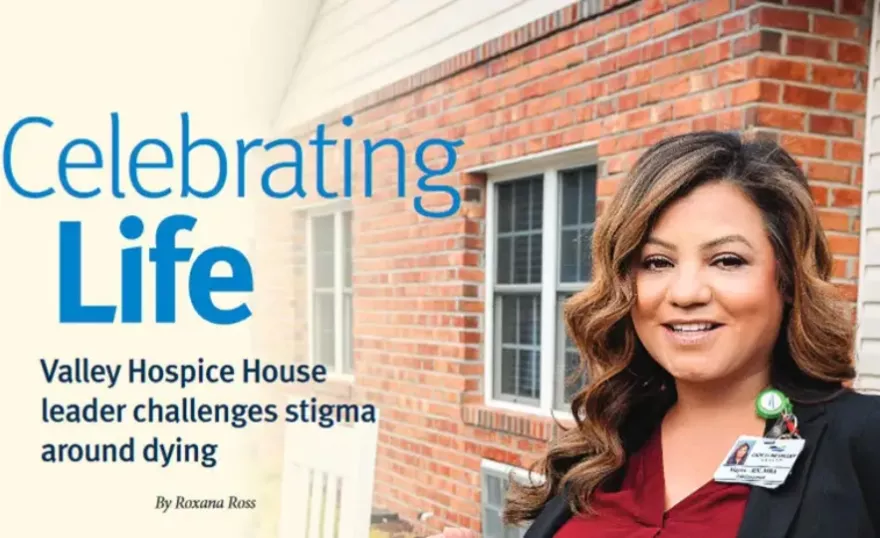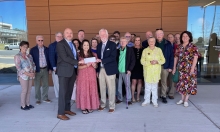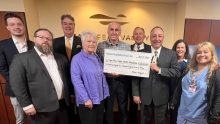General News
When Mayra Draughn was a new nurse, she witnessed a moment that has stuck with her throughout her career: the pain a patient’s death caused their loved one.
“I remember there was the sweet elderly man, and his wife came to us when she was very sick and actively passing,” Draughn said. “He was not ready to let her go. I still remember his scream in agony as she took her last breath. At the time, no one from the palliative team or Hospice had seen him to talk to him about the expected course of his wife's illness. When families of terminally ill patients have an opportunity to speak at length with medical staff about their fears, concerns, and questions, they may be better able to cope with their loved one’s death. I really took that to heart.”
As the new Patient Care Manager of Valley Hospice House, Draughn has more than 20 years of healthcare experience since that day. She’s worn many different hats in multiple areas, from orthopedics to renal, claims to palliative care. One thing that hasn’t changed is her belief that a loved one’s death can be easier if it is talked about and prepared for when the time comes.
“There’s such a stigma about dying,” she said. “But it’s part of our journey. It might not be the beginning, but it’s the last stage. People see birth as a celebration, but passing should be a celebration, too; it’s just the end, and that’s okay. Sometimes death is definitely sad; you might not see your mom or your dad tomorrow. But the memories are there, and completing the journey is a celebration.”
Because Fayetteville has been without a Hospice House for a decade, Draughn has a lot of work to do to reintroduce the concept to the community. Valley Hospice House is designed to be as home-like as possible, with rooms for families to gather to eat, sleep and be close to their loved ones in their final days. There are no loud code calls and intercom noises, and the atmosphere is calm. Specially trained staff don’t just look after the patients, they consider the physical, emotional, spiritual and social needs of the patients and their loved ones.
“Nobody wants to die in a hospital when you cannot have peace and feel calm,” she said. “Home hospice agencies can help patients who want to pass at home, but maybe patients don’t have the support system, or maybe their families have to continue to work, and there’s no one to take care of them. It’s a big deal. They need somewhere quiet and peaceful where they can be comfortable.”
Educating the community about the benefits of a hospice experience, and a hospice house, is a challenge Draughn is looking forward to.
“As a first-generation Hispanic female, I have witnessed race, ethnicity and socioeconomic status as the leading differentiating factors fueling disparities in palliative and hospice utilization,” she said. “My goal is to strategize with leaders in the community to improve access to end-of-life care among historically underserved populations, seeking to bridge racial divides to hospice and palliative care. Addressing demographic disparities in hospice utilization can ensure more patients receive quality care at the end-of-life. My biggest goal is to build that trust in the community.”
The eight-bed Valley Hospice House will serve a portion of that need in the community, for patients who are under hospice care but cannot stay at home. Draughn says it’s a form of charity for the community, as well as a chance for others to give back. She also expects Valley Hospice House to have patients from all over the region, not just Fayetteville.
“We’re going to touch a lot of people. We’re here for everyone,” she said. “Hospice homes don’t make money, but it’s a way for us to be there for the community. I’m humbled to be a part of this rewarding work, to do this for the community. My goal is to continue to grow, with the community’s support, and with the Foundation’s support. We welcome volunteers who want help.”
Before coming to Fayetteville last year to take the lead at Valley Hospice House, Draughn was living in Winston-Salem. As well as offering her a chance to follow her heart to serve patients as they complete their journey, it also allowed her to follow her heart and join her husband. As a sergeant first class with the 82nd Airborne Division at Fort Liberty, he was splitting his time between Fayetteville and Winston-Salem, but now the entire family can stay together.
A big beach fan, it didn’t hurt that the move cut her drive to the ocean by more than half. She said she’s also enjoying Fayetteville’s diverse culture and food.
“We’re all different, and we all have different beliefs, and that’s also why the hospice house is important here,” she said. “We have a great team that will be respectful of whatever you believe, and we’ll have resources for all families.”




